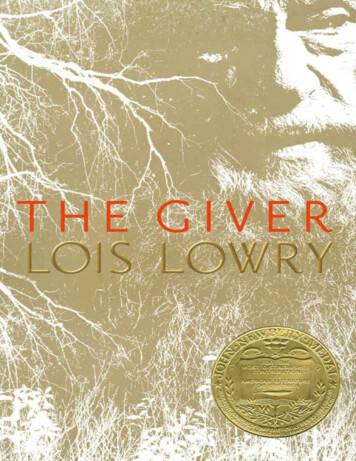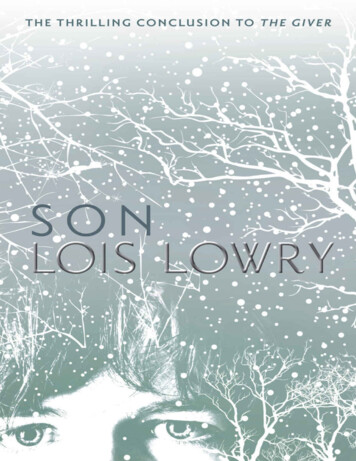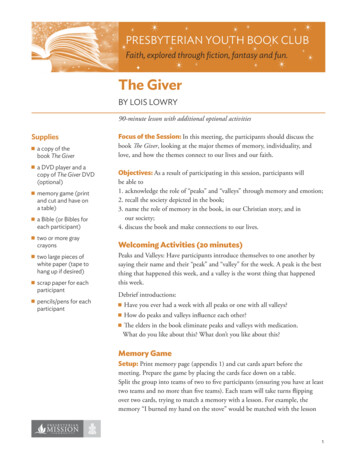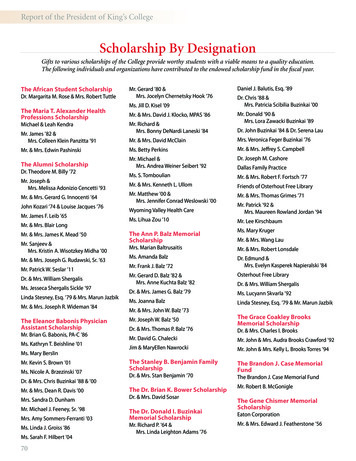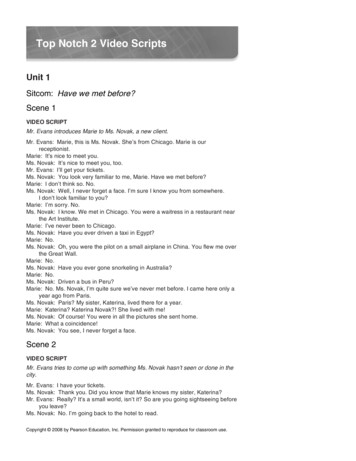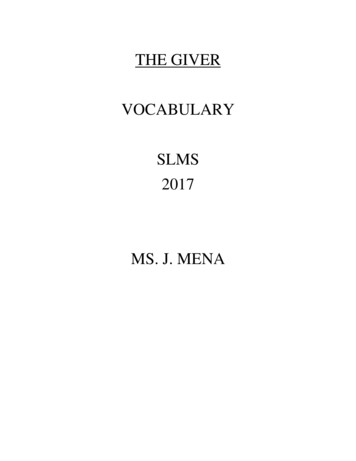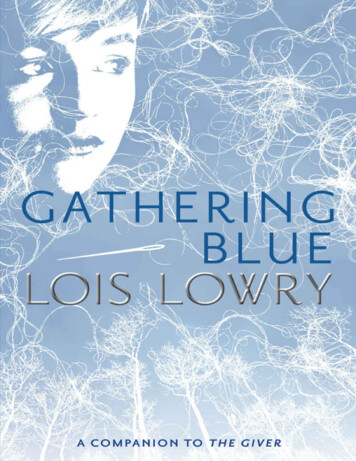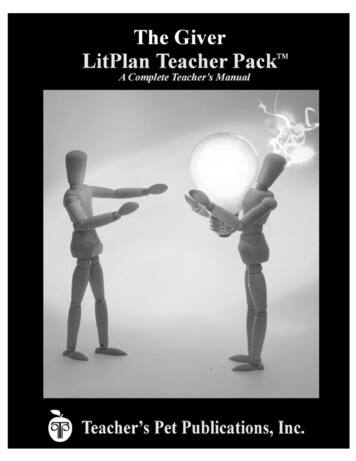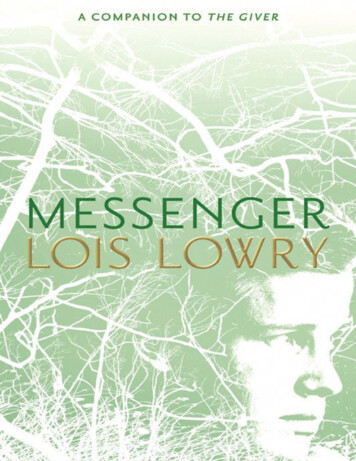
Transcription
Table of ContentsTitle PageTable of venteenEighteenNineteenTwentyTwenty-oneSample Chapter from SONBuy the BookThe Giver QuartetAbout the Author
Copyright 2004 by Lois LowryAll rights reserved. Published in the United States by Houghton Mifflin Books for Children, animprint of Houghton Mifflin Harcourt Publishing Company. Originally published in hardcover in theUnited States by Houghton Mifflin Books for Children, 2000.For information about permission to reproduce selections from this book, write to Permissions,Houghton Mifflin Harcourt Publishing Company, 215 Park Avenue South, New York, New York10003.www.hmhbooks.comThe Library of Congress has cataloged the print edition as follows:Lowry, Lois.Messenger / Lois Lowry.p. cm.“Walter Lorraine Books.”Summary: In this novel that unites characters from “The Giver” and “Gathering Blue,” Matty, a youngmember of a utopian community that values honesty, conceals an emerging healing power that hecannot explain or understand.ISBN: 978-0-547-99567-0[1. Utopias—Fiction. 2. Community life—Fiction. 3. Healing—Fiction.] I. Title.PZ7.L9673Me 2004[Fic]—dc222003014789eISBN 978-0-547-34589-5v2.0812
OneMatty was impatient to have the supper preparations over and done with. He wanted to cook, eat, andbe gone. He wished he were grown so that he could decide when to eat, or whether to bother eating atall. There was something he needed to do, a thing that scared him. Waiting just made it worse.Matty was no longer a boy, but not yet a man. Sometimes, standing outside the homeplace, hemeasured himself against the window. Once he had stood only to its sill, his forehead there, pressinginto the wood, but now he was so tall he could see inside without effort. Or, moving back in the highgrass, he could see himself reflected in the glass pane. His face was becoming manly, he thought,though childishly he still enjoyed making scowls and frowns at his own reflection. His voice wasdeepening.He lived with the blind man, the one they called Seer, and helped him. He cleaned the homeplace,though cleaning bored him. The man said it was necessary. So Matty swept the wooden floor each dayand straightened the bedcovers: neatly on the man’s bed, with haphazard indifference on his own, inthe room next to the kitchen. They shared the cooking. The man laughed at Matty’s concoctions andtried to teach him, but Matty was impatient and didn’t care about the subtlety of herbs.“We can just put it all together in the pot,” Matty insisted. “It all goes together in our belliesanyway.”It was a long-standing and friendly argument. Seer chuckled. “Smell this,” he said, and held out thepale green shoot that he’d been chopping.Matty sniffed dutifully. “Onion,” he said, and shrugged. “We can just throw it in.“Or,” he added, “we don’t even need to cook it. But then our breath stinks. There’s a girl promisedshe’d kiss me if I have sweet breath. But I think she’s teasing.”The blind man smiled in the boy’s direction. “Teasing’s part of the fun that comes before kissing,”he told Matty, whose face had flushed pink with embarrassment.“You could trade for a kiss,” the blind man suggested with a chuckle. “What would you give? Yourfishing pole?”“Don’t. Don’t joke about the trading.”“You’re right, I shouldn’t. It used to be a light-hearted thing. But now—you’re right, Matty. It’s notto be laughed at anymore.”“My friend Ramon went to the last Trade Mart, with his parents. But he won’t talk about it.”“We won’t then, either. Is the butter melted in the pan?”Matty looked. The butter was bubbling slightly and golden brown. “Yes.”“Add the onion, then. Stir it so it doesn’t burn.”Matty obeyed.“Now smell that,” the blind man said. Matty sniffed. The gently sautéing onion released an aromathat made his mouth water.“Better than raw?” Seer asked.“But a bother,” Matty replied impatiently. “Cooking’s a bother.”“Add some sugar. Just a pinch or two. Let it cook for a minute and then we’ll put the rabbit in.Don’t be so impatient, Matty. You always want to rush things, and there’s no need.”“I want to go out before night comes. I have something to check. I need to eat supper and get outthere to the clearing before it’s dark.”The blind man laughed. He picked up the rabbit parts from the table, and as always, Matty was
amazed at how sure his hands were, how he knew just where things had been left. He watched whilethe man deftly patted flour onto the pieces of meat and then added the rabbit to the pan. The aromachanged when the meat sizzled next to the softened onion. The man added a handful of herbs.“It doesn’t matter to you if it’s dark or light outside,” Matty told him, scowling, “but I need thedaylight to look at something.”“What something is that?” Seer asked, then added, “When the meat has browned, add some brothso it doesn’t stick to the pan.”Matty obeyed, tilting into the pan the bowl of broth in which the rabbit had been boiled earlier. Thedark liquid picked up chunks of onion and chopped herbs, and swirled them around the pieces ofmeat. He knew to put the lid on now, and to turn the fire low. The stew simmered and he began to setthe plates on the table where they would have their supper together.He hoped the blind man would forget that he had asked what something. He didn’t want to tell.Matty was puzzled by what he had hidden in the clearing. It frightened him, not knowing what itmeant. He wondered for a moment whether he could trade it away.When, finally, the supper dishes were washed and put away, and the blind man sat in the cushionedchair and picked up the stringed instrument that he played in the evening, Matty inched his way to thedoor, hoping to slip away unnoticed. But the man heard everything that moved. Matty had known himto hear a spider scurry from one side of its web to another.“Off to Forest again?”Matty sighed. No escaping. “I’ll be back by dark.”“Could be. But light the lamp, in case you’re late. After dark it’s nice to have window light to aimfor. I remember what Forest was like at night.”“Remember from when?”The man smiled. “From when I could see. Long before you were born.”“Were you scared of Forest?” Matty asked him. So many people were, and with good reason.“No. It’s all an illusion.”Matty frowned. He didn’t know what the blind man meant. Was he saying that fear was an illusion?Or that Forest was? He glanced over. The blind man was rubbing the polished wooden side of hisinstrument with a soft cloth. His thoughts had turned to the smooth wood, though he couldn’t see thegolden maple with its curly grain. Maybe, Matty thought, everything was an illusion to a man whohad lost his eyes.Matty lengthened the wick and checked the lamp to be certain there was oil. Then he struck amatch.“Now you’re glad I made you clean the soot from the lamp chimneys, aren’t you?” The blind mandidn’t expect an answer. He moved his fingers on the strings, listening for the tone. Carefully, as hedid most evenings, he tuned the instrument. He could hear variations in sounds that seemed to the boyto be all the same. Matty stood in the doorway for a moment, watching. On the table, the lampflickered. The man sat with his head tilted toward the window so that the summer early-evening lightoutlined the scars on his face. He listened, then turned a small screw on the back of the instrument’swooden neck, then listened again. Now he was concentrating on the sounds, and had forgotten the boy.Matty slipped away.Heading for the path that entered Forest at the edge of Village, Matty went by a roundabout way sothat he could pass the home of the schoolteacher, a good-hearted man with a deep red stain that
covered half of his face. Birthmark, it was called. When Matty was new to Village, he had sometimesfound himself staring at the man because he had never known anyone before with such a mark. WhereMatty had come from, flaws like that were not allowed. People were put to death for less.But here in Village, marks and failings were not considered flaws at all. They were valued. Theblind man had been given the true name Seer and was respected for the special vision that he hadbehind his ruined eyes.The schoolteacher, though his true name was Mentor, was sometimes affectionately called “Rosy”by the children because of the crimson birthmark that spread across his face. Children loved him. Hewas a wise and patient teacher. Matty, just a boy when he first came here to live with the blind man,had attended school full time for a while, and still went for added learning on winter afternoons.Mentor had been the one who taught him to sit still, to listen, and eventually to read.He passed by the schoolteacher’s house not to see Mentor, or to admire the lavish flower garden,but in hopes of seeing the schoolteacher’s pretty daughter, who was named Jean and who had recentlyteased Matty with the promise of a kiss. Often she was in the garden, weeding, in the evenings.But tonight there was no sign of her, or her father. Matty saw a fat spotted dog sleeping on theporch, but it appeared that no one was at home.Just as well, he thought. Jean would have delayed him with her giggles and teasing promises—which always came to nothing, and Matty knew that she made them to all the boys—and he should noteven have made the side trip in hopes of seeing her.He took a stick and drew a heart in the dirt on the path beside her garden. Carefully he put her namein the heart, and his own below it. Maybe she would see it and know he had been there, and maybeshe would care.“Hey, Matty! What are you doing?” It was his friend Ramon, coming around the corner. “Have youhad supper? Want to come eat with us?”Quickly Matty moved toward Ramon, hiding the heart traced in the dirt behind him and hoping hisfriend wouldn’t notice it. It was always fun, in a way, to go to Ramon’s homeplace, because hisfamily had recently traded for something called a Gaming Machine, a large decorated box with ahandle that you pulled to make three wheels spin around inside. Then a bell rang and the wheelsstopped at a small window. If their pictures matched, the machine spit out a chunk of candy. It wasvery exciting to play.Sometimes he wondered what they had sacrificed for the Gaming Machine, but one never asked.“We ate already,” he said. “I have to go someplace before it gets dark, so we ate early.”“I’d come with you, but I have a cough, and Herbalist said I shouldn’t run around too much. Ipromised to go right home,” Ramon said. “But if you wait, I’ll run and ask . . .”“No,” Matty replied quickly. “I have to go alone.”“Oh, it’s for a message?”It wasn’t, but Matty nodded. It bothered him a little to lie about small things. But he always had; hehad grown up lying, and he still found it strange that the people in this place where he now livedthought lying was wrong. To Matty, it was sometimes a way of making things easier, morecomfortable, more convenient.“See you tomorrow, then.” Ramon waved and hurried on toward his own homeplace.Matty knew the paths of Forest as if he had made them. And indeed, some of them were of his making,over the years. The roots had flattened as he made his way here and there, seeking the shortest, safestroute from place to place. He was swift and quiet in the woods, and he could feel the direction of
things without landmarks, in the same way that he could feel weather and was able to predict rainlong before the clouds came or there was a shift in wind. Matty simply knew.Others from Village rarely ventured into Forest. It was dangerous for them. Sometimes Forestclosed in and entangled people who had tried to travel beyond. There had been terrible deaths, withbodies brought out strangled by vines or branches that had reached out malevolently around thethroats and limbs of those who decided to leave Village. Somehow Forest knew. Somehow, too, itknew that Matty’s travels were benign and necessary. The vines had never reached out for him. Thetrees seemed, sometimes, almost to part and usher him through.“Forest likes me,” he had proudly commented once to the blind man.Seer had agreed. “Maybe it needs you,” he pointed out.The people needed Matty, too. They trusted him to know the paths, to be safe on them, and to do theerrands that required traveling through the thick woods with its complicated, mazelike turnings. Hecarried messages for them. It was his job. He thought that when it came time to be assigned his truename, Messenger would be the choice. He liked the sound of it and looked forward to taking thattitle.But this evening Matty was not carrying or collecting a message, though he had fibbed and toldRamon so. He headed to a clearing he knew of, a place that lay just beyond a thick stand of bristlypines. Deftly he jumped a small brook, then turned off the worn path to proceed between two trees,pushing his way through. These trees had grown fast in recent years, and now the clearing wascompletely concealed and had become Matty’s private place.He needed privacy for this thing he was discovering about himself: a place to test it in secret, toweigh his own fear for what it meant.It was dim in the clearing. Behind him, the sun was starting to set over Village, and the light thatreached down through Forest was pinkish and pale. Matty made his way across the mossy ground ofthe clearing to a thicket of tall ferns near the base of a tree. He squatted there and listened, leaning hishead toward the ferns. Softly he made a sound, one he had practiced; a brief moment later, he heardthe sound he had both hoped and dreaded to hear, in response.He reached gently into the undergrowth and lifted out a small frog. From his hand, it looked up athim through bulging, unafraid eyes, and made the sound again: churrump.Churrump.Churrump.Matty repeated the frog’s throaty sound, as if they were conversing. Though he was nervous, theback-and-forth sounds made him laugh a little. He examined the slick green body carefully. The frogmade no effort to leap from his hand. It was passive in his palm, and the deep translucent throatquivered.He found what he was looking for. In a way, he had hoped he would not. His life would be easier,Matty knew, if the little frog were unmarked and ordinary. But it was not; he had known it would notbe; and he knew that things were all shifting for him now. His future had taken a new and secret turn.It was not the frog’s fault, he realized, and gently he replaced the small green creature in the tall fernsand watched the fronds tremble as it moved away, unaware. He realized that he was trembling aswell.Returning to Village along the path that was deep in shadows now, Matty heard sounds from the areabeyond the marketplace. At first he thought in surprise that people were singing. Singing was commonin Village, but usually not outdoors, not in the evening. Puzzled, he paused and listened. It was not
singing at all, Matty realized, but the rhythmic and mournful sound they called keening, the sound ofloss. He set aside his other worries and began to hurry through the evening’s last light to thehomeplace, where the blind man would be waiting and would explain.
TwoDid you hear about what happened to Gatherer last night? He tried to go back but it had been toolong.” Ramon and Matty, carrying their fishing rods, had met for an excursion to catch salmon, andRamon was bursting with the news.Matty winced at what his friend said. So Gatherer had been taken by Forest. He was a cheerful manwho loved children and small animals, who smiled often and told boisterous jokes.Ramon spoke in the self-important tone of one who likes being a conveyor of news. Matty was veryfond of his friend but sometimes suspected that his true name might eventually turn out to be Boaster.“How do you know?”“They found him last night on the path behind the schoolhouse. After I left you, I heard thecommotion. I saw them bring his body in.”“I heard the noise. Seer and I thought it must be someone taken.”Matty had arrived at the homeplace the night before to find the blind man preparing for bed andlistening attentively to the low collective moan, clearly a large number of people grieving.“Someone’s been lost,” the blind man had said with a worried look, pausing while unbuckling hisshoes. He sat on his bed, dressed in his nightshirt.“Should I take a message to Leader?”“He’ll know already, from the sound. It’s a keening.”“Should we go?” Matty asked him. In a way, he had wanted to. He had never attended a keening.But in another way, he was relieved to see the blind man shake his head no.“They have enough. It sounds like a good-sized group; I can hear at least twelve.”As always, Matty was amazed at the capacity of the blind man’s perceptions. He himself heardonly the chorus of wails. “Twelve?” he asked, and then teased, “Are you sure it’s not eleven, orthirteen?”“I hear at least seven women,” the blind man said, not noticing that Matty had intended it as a joke.“Each has a different pitch. And I think five men, though one is quite young, maybe your age. Thevoice is not as deep as it will be later. It may be that friend of yours; what’s his name?”“Ramon?”“Yes. I think I hear Ramon’s voice. He’s hoarse.”“Yes, he has a cough. He’s taking herbs for it.”Now, recalling it, Matty asked his friend, “Did you keen? I think we may have heard you.”“Yes. They had enough. But since I was there, they let me join. I have this cough, though, so myvoice wasn’t very good. I only went because I wanted to see the body. I’ve never seen one.”“Of course you have. You were with me when we watched them lay out Stocktender for burial. Andyou saw that little girl after she fell in the river and they pulled her out drowned. I remember youwere there.”“I meant entangled,” Ramon explained. “I’ve seen plenty of dead. But till last night I never saw oneentangled.”Neither had Matty. He had only heard of it. Entangling happened so rarely that he had begun to thinkof it as a myth, something from the past. “What was it like? They say it’s hideous.”Ramon nodded. “It was. It looked as if first the vines grabbed him by the neck and pulled tight.Poor Gatherer. He had grabbed at them to pull loose but then they curled around his hands as well. Hewas completely entangled. The look on his face was fearsome. His eyes were open but twigs and all
had started to enter under the lids. And they were in his mouth, too. I could see something wrappedaround his tongue.”Matty shuddered. “He was such a nice man,” he said. “He always tossed berries to us when he wasout gathering. I would open my mouth wide and he would aim for it. If I caught a berry in my mouth hecheered and gave me extra.”“Me too.” Ramon looked sad. “And his wife has a new baby. Someone said that’s why he went. Hewanted to go tell her family about the baby.”“But didn’t he know what would happen? Hadn’t he received Warnings?”Ramon coughed suddenly. He bent over and gasped. Then he straightened up and shrugged. “Hiswife says not. He went once before, when their first child was born, and had no trouble. NoWarning.”Matty thought about it. Gatherer must have overlooked a Warning. The early ones were sometimessmall. He felt great sadness for the gentle, happy man who had been so brutally entangled and had lefttwo children fatherless. Forest always gave Warnings, Matty knew. He entered so often himself andalways was watchful. If he had one Warning, even the smallest, he would never enter again. The blindman had entered only once, to return to his original village when it needed his wisdom. He had comeback safely, but he had had a small Warning on his return: a sudden painful puncture from what hadseemed a tiny twig. He couldn’t see it, of course, though later he said he had felt it come forward, hadperceived it with the kind of knowledge that had made the people designate Seer as his true name. ButMatty, still a young boy, had been with him then, as a guide; and Matty had seen the twig grow,expand, sharpen, aim itself, and stab. There was no question. It was a Warning. The blind man couldnever enter Forest again. His time for going back had ended.Yet Matty had never been warned. Again and again he entered Forest, moved along its trails, spoketo its creatures. He understood that for some reason, he was special to Forest. He had traveled itspaths for years, six years now, since that first time, when he was still very young and had left thehome that had been cruel to him.“I’m never going in,” Ramon said firmly. “Not after seeing what it did to Gatherer.”“You don’t have a place to go back to,” Matty pointed out. “You were born in Village. It’s onlythose who try to go back to someplace that they left once.”“Like you, maybe.”“Like me, except I’m careful.”“I’m not taking the chance. Is this a good place to fish?” Ramon asked, changing the subject. “Idon’t want to walk any farther. I’m tired all the time lately.” They had been ambling toward the river,skirting the cornfield, and had reached the grassy bank where they often fished together. “We caught alot here last time. My mother cooked some for dinner, but there were so many that I nibbled on leftovers while I was playing the Gaming Machine after dinner.”The Gaming Machine again. Ramon mentioned it so often. Maybe Gloater would be his true name,Matty thought. He had already decided on Boaster, but now, in his mind, he decided Gloater wasmore appropriate. Or Bragger. He was tired of hearing about the Gaming Machine. And a littlejealous, too.“Yes, here,” Matty said. He scrambled down the slippery bank to the place where a boulder, largeenough to stand on, jutted out. Both boys climbed the huge outcropping of rock and settled at the top toprepare their fishing gear and cast their lines for salmon.Behind them, Village, quiet and peaceful, continued its daily life. Gatherer had been buried thismorning. With her toddler playing on the floor by her feet, his widow now nursed her new baby on the
porch of her homeplace, attended by comforting women who sat with their knitting and embroideryand spoke only of happy things.In the schoolhouse, Mentor, the schoolteacher, gently tutored a mischievous eight-year-old namedGabe, who had neglected his studies to play and now needed help. His daughter, Jean, sold flowerbouquets and loaves of fresh-baked bread in her marketplace stall while she flirted, laughing, with thegangly, self-conscious boys who stopped by.The blind man, Seer, made his way through the lanes of Village, checking on the populace,assessing the well-being of each individual. He knew each fence post, each crossroad, each voiceand smell and shadow. If anything was amiss, he would do his best to make it right.From a window, the tall young man known as Leader looked down and watched the slow andcheerful pace of Village, of the people he loved, who had chosen him to rule and guard them. He hadcome here as a boy, finding his way with great difficulty. The Museum held the remains of a brokensled in a glass case, and the inscription explained that it had been Leader’s arrival vehicle. Therewere many relics of arrival in the Museum, because each person who had not been born in Villagehad his own story of coming there. The blind man’s history was told there, too: how he had beencarried, near dead, from the place where enemies had left him with his eyes torn out and his future inhis own place gone.In the Museum’s glass cases there were shoes and canes and bicycles and a wheeled chair. Butsomehow the small red-painted sled had become a symbol of courage and hope. Leader was youngbut he represented those things. He had never tried to go back, never wanted to. This was his homenow, these his people. As he did every afternoon, he stood at the window and watched. His eyeswere a pale, piercing blue.He watched with gratitude as the blind man moved through the lanes.He could see beyond a porch railing to the young woman who rocked an infant and mourned herhusband. Grieve gently, he thought.He could see beyond the cornfield to where two young boys named Matty and Ramon weredangling lines into the river. Good fishing, he thought.He could see beyond the marketplace to the cemetery where Gatherer’s ruined body had beenburied. Rest in peace, he thought.Finally he looked toward the border of Village, to the place where the path entered Forest andbecame shrouded in shadows. Leader could see beyond the shadows but was not certain what he saw.It was blurred, but there was something in Forest that disturbed Leader’s consciousness and made himuneasy. He could not tell whether it was good or bad. Not yet.Deep in the thick undergrowth near the clearing, at the edge of Leader’s puzzled awareness, a smallgreen frog ate an insect it had caught with its sticky, fast-darting tongue. Squatting, it moved itsprotruding eyes around, trying to sense more insects to devour. Finding nothing, it hopped away. Oneback leg was oddly stiff but the frog barely noticed.
ThreeIf we had a Gaming Machine,” Matty commented in a studied, offhand manner, “our evenings wouldnever be boring.”“You think our evenings are boring, Matty? I thought you enjoyed our reading together.”Seer laughed, and corrected himself. “Sorry. I meant your reading to me, Matty, and my listening.It’s my favorite time of day.”Matty shrugged. “No, I like reading to you, Seer. But I meant it’s not exciting.”“Well, we should choose a different book, perhaps. That last one—I’ve forgotten its name, Matty—was a little slow-going. Moby Dick. That was the one.”“It was okay,” Matty conceded. “But it was too long.”“Well, ask at the library for something that would move along more quickly.”“Did I explain to you how a Gaming Machine works, Seer? It moves very quickly.”The blind man chuckled. He had heard it all before, many times. “Run out to the garden and get ahead of lettuce, Matty, while I finish cleaning the fish. Then you can make a salad while the fishcooks.”“And also,” Matty continued in a loud voice as he headed for the garden just beyond the door, “itwould be a nice end to a meal. Something sweet. Sort of a dessert. I did tell you, didn’t I, how theGaming Machine gives you a candy when you win?”“See if there’s a nice ripe tomato while you’re out there getting the lettuce. A sweet one,” Seersuggested in an amused voice.“You might get a peppermint,” Matty went on, “or a gumdrop, or maybe something they call asourball.” Beside the back step he reached into the vegetable garden and uprooted a small head oflettuce. As an afterthought, he pinched a cucumber loose from its vine nearby, and pulled some leavesfrom a clump of basil. Back in the kitchen, he put the salad things in the sink and halfheartedly beganto wash them.“Sourballs come in different colors, and each color is a flavor,” he announced, “but I suppose thatwouldn’t interest you.”Matty sighed. He looked around. Even though he knew the blind man wouldn’t see his gesture, hepointed to the nearby wall, which was decorated by a colorful wall-hanging, a gift from the blindman’s talented daughter. Matty stood often before it, looking carefully at the intricate embroideredtapestry depicting a large thick forest separating two small villages far from each other. It was thegeography of his own life, and that of the blind man, for they had both moved from that place to thisother, with great difficulty.“The Gaming Machine could stand right there,” he decided. “It would be very convenient.Extremely convenient,” he added, aware that the blind man liked it when he exercised his vocabulary.Seer went to the sink, moved the washed lettuce to the side, and began to rinse the cleaned salmonsteaks. “And so we would give up—or maybe even trade away—reading, and music, in exchange forthe extreme excitement of pulling a handle and watching sourballs spit forth from a mechanicaldevice?” he asked.Put that way, Matty thought, the Gaming Machine didn’t actually seem such a good trade. “Well,” hesaid, “it’s fun.”“Fun,” the blind man repeated. “Is the stove ready? And the pan?”Matty looked at the stove. “In a minute,” he said. He stirred the burning wood a bit so that the fire
flared. Then he placed the oiled pan on top. “I’ll do the fish,” he said, “if you fix the salad.“I brought some basil in, too,” he added, with a grin, “just because you’re such a saladperfectionist. It’s right there beside the lettuce.” He watched while the blind man’s deft hands foundthe basil and tore the leaves into the wooden bowl.Then Matty took the fish and laid it in the pan, swirling the oil around. In a moment the aroma of thesautéing salmon filled the room.Outside, it was twilight. Matty adjusted the wick on an oil lamp and lighted it. “You know,” heremarked, “when you win a candy, a bell rings and colored lights blink. Of course that wouldn’tmatter to you,” he added, “but some of us would really appreciate—”“Matty, Matty, Matty,” the blind man said. “Keep an eye on that fish. It cooks quickly. No bell ringswhen it’s done.“And don’t forget,” he added, “that they traded for that Gaming Machine. It probably came at a highcost.”Matty frowned. “Sometimes you get licorice,” he said as a last attempt.“Do you know what they traded? Has Ramon told you?”“No. Nobody ever tells.”“Maybe he doesn’t even know. Maybe his parents didn’t tell him. That’s probably good.”Matty took the pan from the stove and slid the browned fish onto two plates, one after the other. Heplaced them on the table and brought the salad bowl from the sink. “It’s ready,” he said.The blind man went to the bread container and found two thick pieces of bread that smelled freshbaked. “I got this at the marketplace this morning,” he said, “from Mentor’s daughter. She’ll makesomeone a good wife. Is she as pretty as her voice makes her sound?”But Matty was not going to be diverted by reminders of the schoolteacher’s pretty daughter.“When’s the next Trade Mart?” he asked, when they were both seated.“You’re too young.”“I heard that there was one coming soon.”“Pay no attention to what you h
was a wise and patient teacher. Matty, just a boy when he first came here to live with the blind man, had attended school full time for a while, and still went for added learning on winter afternoons. Mentor had been the one who ta
